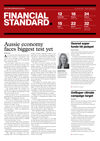Carbon tariffs on some imports urgently needed: Climate Energy FinanceBY KARREN VERGARA | THURSDAY, 5 JUN 2025 3:30PMDespite the raging global trade war, Climate Energy Finance (CEF) is calling for carbon tariffs on some imports and for Australia to lead the way for a regional Asian carbon border adjustment mechanism (CBAM). CEF argues in its new report A price on carbon: Building towards an Asian carbon border adjustment mechanism that carbon border tariffs in international trade are urgently needed to put a price on the carbon emissions embedded in the production of industrial commodities such as iron and steel, aluminium and cement, which make up 15% of global emissions. "This will help correct the historic market failure to price carbon that has fed into to the climate crisis and support global emissions reduction goals. Critically, it will shift investment from fossil fuels into clean energy and the production of 'green' industrial commodities," CEF said. Energy Minister Chris Bowen recently flagged that a carbon tariff on some imports is something he would consider. Building on this possibility, CEF's report highlights that pricing carbon in international trade is the single most effective measure to enable the transformation to a decarbonised global economy via the least-cost pathway. Further, it calls for a regulated, progressively rising price on carbon in international trade in Asia to reflect the social cost of the carbon emissions embedded in the production of emissions-intensive industrial commodities, and to effectively value those embodying renewable energy in their production, thus incentivising "embodied decarbonisation". CEF urges Australia to work closely with economically advanced, industry-intensive neighbours in the Asia Pacific. The initial focus would be on a joint development of a regional CBAM by Australia, China, South Korea and Japan, starting with the high emissions, world-leading steel, aluminium and cement value chains. This involves a coordinated, targeted government intervention from key industrial economies across the Asia Pacific "to correct the persistent global market failure of unpriced emissions" in the production of fossil fuel-intensive commodities required to achieve net zero. CEF director and the report's co-author Tim Buckley said: "The lead up to COP31 is also an opportunity for Australia to build on our domestic momentum as we price in industrial carbon emissions via the Safeguard Mechanism and decarbonise our electricity system, creating a path to an Asian CBAM. Initially in economically advanced East Asia and Australia, a regional CBAM would mobilise private capital at speed and scale for decarbonising international trade." Buckley added this would "align and leverage the EU's climate leadership demonstrated in its CBAM, accelerating the global race to decarbonise in alignment with the immutable climate science." Green Energy Statecraft Project director Elizabeth Thurbon commented the recommendations in the report address the fundamental market formation challenges currently preventing investment in clean commodity production. "They provide the long-term policy solutions needed to seize the once in a generation economic, environmental and geostrategic opportunities facing Australia. Building towards a price on carbon through international commodity trade enables urgent policy levers like multilateral clean commodity trading initiatives that are necessary to support first of a kind projects," she said. Related News |

First Sentier Investors' global head of responsible investment Kate Turner joins The Greener Way to discuss how accounting for the many inter-reactions and flow-on effects of addressing specific sustainability issues can lead to improved outcomes.
ASX-listed Plenti Group has won a mandate from the Western Australian government to help the state accelerate the adoption of batteries.
Despite the raging global trade war, Climate Energy Finance (CEF) is calling for carbon tariffs on some imports and for Australia to lead the way for a regional Asian carbon border adjustment mechanism (CBAM).
Although investors are withdrawing from climate investing due to uncertainty from the aggressive approach by the US President Donald Trump in his pro-fossil fuels and anti-energy agenda, it opens up opportunities further afield.

















